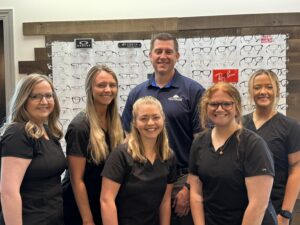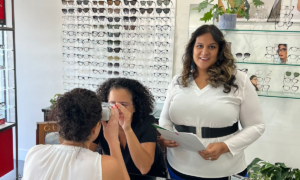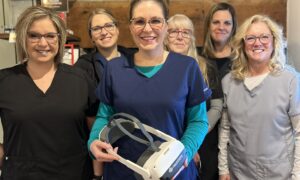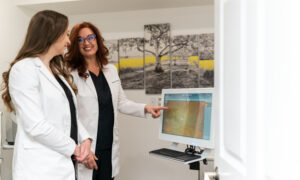
Dr. Kachelman with his team of scribes. Dr. Kachelman says scribes can provide added attention to the patient journey while helping make your practice run better.
Office scribe benefits and training
By Benjamin Kachelman, OD
June 19, 2024
In Shakespeare’s Hamlet, the titular character raises a skull, and questions his own existence: “To be, or not to be? That is the question.”
For our purposes, that famous quote can be re-framed: “To scribe, or not to scribe? That is the question.”
It is true that all offices may not have the capabilities or resources to hire scribes, but for those practices that can do it, let me provide some reasons scribes work well for us. I also will share our approach to the use of scribes.
One Person to Guide Patients Through Their Visit
How many people, outside of your immediate family, do you spend one hour with in a week? If I had to guess, I would say not many. We may spend an hour in a business lunch, or an hour watching kids play sports.
Mostly, spending at least an hour with someone is reserved for people with whom we have close relationships. This is the first reason for having a scribe as you see patients. You can use the scribe as the person who sticks with the patient from the time they enter your office until when they leave, which, ideally, should not take longer than an hour.
From the moment a patient begins the process of moving through the office, there are various “touch points” (i.e., front desk, prep, exam, optical, etc.). What if each part of the process was experienced with the same person acting almost as a guide?
Using a scribe as a patient guide during their visit allows the scribe to develop a deeper relationship with the patient. This contributes to a level of trust between the scribe and patient.
Not only does the patient hear what the doctor says to the patient; they can reinforce ideas, or answer questions, that may arise after the exam is over. This also allows for the scribe to address needs and concerns that were brought up by the patient, addressed by the doctor and solved in optical.
Scribes Lead to Increased Sales
As the relationship develops, the patient trusts that their personal scribe truly has their best interests in mind when focusing on solutions to each individual problem.
Other Articles to Explore
I did a rudimentary study of what happened to my practice’s eyewear and contact lens sales when I was scribed compared to when I was not scribed.
Over time, comparing the scribed sales to the non-scribed sales, there was a 34.8 percent increase in sales when my patients had a scribe with them who could also sell and address the patient’s needs.
Imagine if every patient who walked through your office’s front doors showed a 34.8 percent increase in what they were willing to purchase within your optical!
How Do I Train a Scribe?
Through years of trial and error, we discovered that teaching sellers how to prep patients for the doctor and scribe was the most successful way to develop scribes. Not everyone is blessed with the ability to understand optical concepts and jargon, and for that reason, the process is simplified to work from the optical direction to the prepping and scribing side.
We have also discovered that in some situations we may teach someone to prep and scribe, and this increases their desire to learn more about optical. The process is longer, but can be just as successful.
Then, of course, the actual scribing needs to be mastered. Knowing where to put certain conditions in the software, and on top of that, how to spell medical terms correctly can be a labor of love, but having patience as the doctor to teach these things can deliver strong benefits to the office!
Hiring & Training Scribes is Not Beyond Your Capabilities
You may be thinking, “I can’t do this.” I’m here to tell you that if you’re thinking about it, you can. Maybe you need a little inspiration to do so. You may surprise yourself with what your office can become.
With that thought, I will leave you with another Shakespearean quote, this time from King Henry the Fourth, Part Two: “Uneasy lies the head that wears the crown.” No, wait! That’s not it! Just kidding!
Try this one from Shakespeare’s Twelfth Night: “Be not afraid of greatness. Some are born great, some achieve greatness, and others have greatness thrust upon them.”
Go out, test the scribing waters, and be great!
 Benjamin Kachelman, OD, practices at Florence Eye Center in Florence, Ala. To contact him: drkachelman@florenceeyecenter.com
Benjamin Kachelman, OD, practices at Florence Eye Center in Florence, Ala. To contact him: drkachelman@florenceeyecenter.com

























